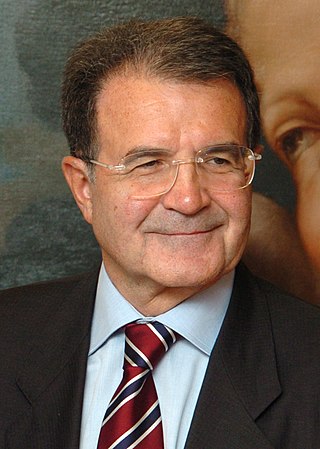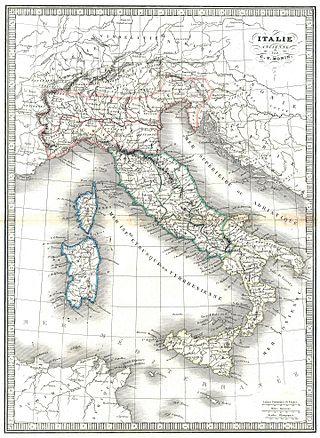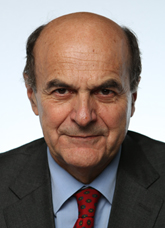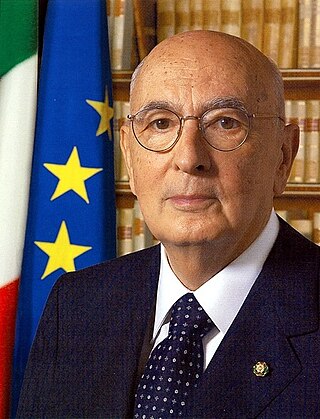
Silvio Berlusconi was an Italian media tycoon and politician who served as the prime minister of Italy in four governments from 1994 to 1995, 2001 to 2006 and 2008 to 2011. He was a member of the Chamber of Deputies from 1994 to 2013; a member of the Senate of the Republic from 2022 until his death in 2023, and previously from March to November 2013; and a member of the European Parliament (MEP) from 2019 to 2022, and previously from 1999 to 2001. With a net worth of US$6.8 billion as of June 2023, Berlusconi was the third-wealthiest person in Italy at the time of his death.

Romano Prodi is an Italian politician who served as President of the European Commission from 1999 to 2004 and twice as Prime Minister of Italy, from 1996 to 1998, and again from 2006 to 2008. Prodi is considered the founder of the Italian centre-left and one of the most prominent figures of the Second Republic. He is often nicknamed Il Professore due to his academic career.

The history of the Italian Republic concerns the events relating to the history of Italy that have occurred since 1946, when Italy became a republic after the 1946 Italian institutional referendum. The Italian republican history is generally divided into two phases, the First and Second Republic.

Enrico Letta is an Italian politician who served as Prime Minister of Italy from April 2013 to February 2014, leading a grand coalition of centre-left and centre-right parties. He was the leader of the Democratic Party (PD) from March 2021 to March 2023.

Pier Luigi Bersani is an Italian politician and was Secretary of the Democratic Party (PD), Italy's leading centre-left party, from 2009 to 2013. Bersani was Minister of Industry, Commerce and Craftmanship from 1996 to 1999, President of Emilia-Romagna from 1993 to 1996, Minister of Transport from 1999 to 2001, and Minister of Economic Development from 2006 to 2008.

Giorgio Napolitano was an Italian politician who served as the 11th president of Italy from 2006 to 2015, the first to be re-elected to the office. In office for 8 years and 244 days, he was the longest-serving president, until the record was surpassed by Sergio Mattarella in 2023. He also was the longest-lived president in the history of the Italian Republic, which has been in existence since 1946. Although he was a prominent figure of the First Italian Republic, he did not take part in the Constituent Assembly of Italy that drafted the Italian constitution; he is considered one of the symbols of the Second Italian Republic, which came about after the Tangentopoli scandal of the 1990s. Due to his dominant position in Italian politics, some critics have sometimes referred to him as Re Giorgio.

The People of Freedom was a centre-right political party in Italy. The PdL launched by Silvio Berlusconi as an electoral list, including Forza Italia and National Alliance, on 27 February for the 2008 Italian general election. The list was later transformed into a party during a party congress on 27–29 March 2009. The party's leading members included Angelino Alfano, Renato Schifani, Renato Brunetta, Roberto Formigoni, Maurizio Sacconi, Maurizio Gasparri, Mariastella Gelmini, Antonio Martino, Giancarlo Galan, Maurizio Lupi, Gaetano Quagliariello, Daniela Santanchè, Sandro Bondi, and Raffaele Fitto.

The political career of Silvio Berlusconi (1994–2011) began in 1994, when Berlusconi entered politics for the first time serving intermittent terms as Prime Minister of Italy from 1994 to 1995, 2001 to 2006 and 2008 to 2011, his career was racked with controversies and trials; amongst these was his failure to honour his promise to sell his personal assets in Mediaset, the largest television broadcaster network in Italy, in order to dispel any perceived conflicts of interest.
Silvio Berlusconi was the Prime Minister of Italy, the head of the country's government, for almost ten years.

The Monti government was the sixty-first government of Italy and was announced on 16 November 2011. This Experts' cabinet was composed of independents, three of whom were women and was formed as an interim government. The government ran the country for eighteen months until the aftermath of the elections in Spring 2013 and then replaced by the Letta government, formed by Enrico Letta on 28 April.

Elsa Fornero is an Italian economist, university lecturer, and politician who served as Minister of Labour and Social Policies in the Monti Cabinet from November 2011 to April 2013.
Events from the year 2012 in Italy:

The 2013 Italian general election was held on 24 and 25 February 2013 to determine the 630 members of the Chamber of Deputies and the 315 elective members of the Senate of the Republic for the 17th Italian Parliament. The centre-left alliance Italy Common Good, led by the Democratic Party (PD), obtained a clear majority of seats in the Chamber of Deputies thanks to a majority bonus that effectively trebled the number of seats assigned to the winning force and narrowly defeated the centre-right alliance of former prime minister Silvio Berlusconi in the popular vote. Close behind, the new anti-establishment Five Star Movement of comedian Beppe Grillo became the third force, well ahead of the centrist coalition of outgoing Prime Minister Mario Monti. In the Senate, no political group or party won an outright majority, resulting in a hung parliament.

Vittorio Grilli is an Italian economist and academic. He was Italy's minister of economy and finance from 2012 to 2013 as part of the Monti cabinet.

Fabrizio Barca is an Italian senior civil servant and politician, who served as a state minister without portfolio for territorial cohesion in the Monti government from 2011 to 2013.

Civic Choice was a centrist and liberal political party in Italy founded by Mario Monti. The party was formed in the run-up of the 2013 general election to support the outgoing Prime Minister Monti and continue his political agenda. In the election SC was part of a centrist coalition named With Monti for Italy, along with Union of the Centre of Pier Ferdinando Casini and Future and Freedom of Gianfranco Fini.
Events in the year 2013 in Italy.
The centre-left coalition is a political alliance of political parties in Italy active under several forms and names since 1995, when The Olive Tree was formed under the leadership of Romano Prodi. The centre-left coalition has ruled the country for more than fifteen years between 1996 and 2021; to do so, it had mostly to rely on a big tent that went from the more radical left-wing, which had more weight between 1996 and 2008, to the political centre, which had more weight during the 2010s, and its main parties were also part of grand coalitions and national unity governments.
The Trichet-Draghi letter, also known as the letter of ECB to Italy, is a confidential correspondence by which, on 5 August 2011, the former and current ECB presidents Jean-Claude Trichet and Mario Draghi addressed to Italian government several requests in order to influence European support to drastic measures of economic rebalancing.























